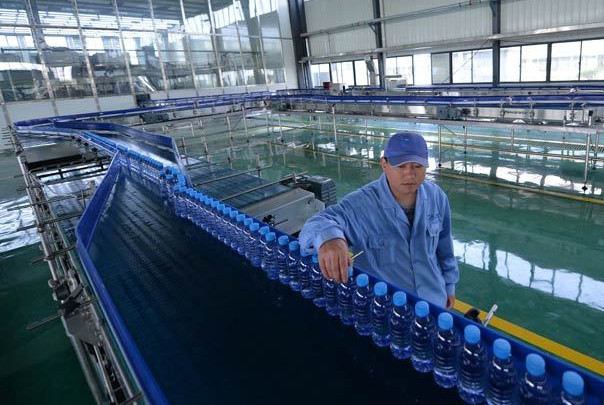
. > TOP STORIES
Solving urban water issues through science
Author : Ma Xianzhong Source : Chinese Social Sciences Today 2014-08-15

A worker inspects bottles of water at the Lianyungang Seawater Desalination Plant in Jiangsu Province on May 19. Desalination is the process of removing dissolved salts from water to convert seawater or brackish water into drinkable water. Photo: Xinhua
China is currently enduring a crippling dry spell. Nearly 5 million hectares in 13 provinces and regions are drought-stricken. Henan, Shaanxi and Shanxi provinces as well as the Inner Mongolia and Xinjiang Uyghur autonomous regions are among the hardest-hit parts of the country where agricultural production has been severely affected, the Chinese Office of State Flood Control and Drought Relief Headquarters announced on July 30.
In August, drought is expected to continue affecting North China’s Huanghe-Huaihe and Changjiang-Huaihe regions and the Jianghan Plain in central and eastern Hubei Province. In the face of this crisis, 200 experts and scholars from around the world recently attended an urban water science forum at the Harbin Institute of Technology (HIT) in Heilongjiang Province to discuss sustainable development of urban water resources.
Crops have been devastated by drought in rural areas, but water security is also a pressing issue in many big cities. Between April 11 and May 9 this year, critical water shortages were reported in Lanzhou, Gansu Province; Wuhan, Hubei Province; and Jingjiang, Jiangsu Province.
Xu Delong, vice president of the Chinese Academy of Engineering (CAE), claimed that the current water crisis is one of the biggest problems caused by China’s economic and social development due to swelling populations, rapid urban development and other historical problems.
“There is an obvious contradiction between current social demands and available water resources,” said Feng Yujie, vice director of the State Key Laboratory of Urban Water Resources and Environment at HIT. Feng added that water is particularly scarce in densely populated cities because development of its necessary infrastructure has lagged behind urbanization.
Zheng Xiaoyun, chairman of the International Water History Association and a research fellow at the Yunnan Academy of Social Sciences, said that rapid urbanization has heightened demands for water and exacerbated water pollution woes due to improper sewage management. Both factors pose key challenges to the supply and management of urban water, Zheng said.
Qian Yi, a CAE member and professor of environmental science at Tsinghua University, said the government has adopted a range of measures to combat water pollution in the Huaihe, Liaohe and Haihe rivers and Dianchi, Chaohu and Taihu lakes in Yunnan, Anhui and Jiangsu provinces respectively.
These measures include closing factories responsible for water pollution, constructing hundreds of urban sewage disposal plants, and enforcing the Cleaner Production Promotion Law (2012) that aims to promote sustainable economic and social development. Nevertheless, water pollution nationwide is still severe and poses a serious threat to drinking water safety and the quality of crops.
Furthermore, Qian proposed that China’s current water resource management model is no longer suited to social development demands. It urgently needs new ideas and strategies, he said.
“The impetus for addressing water pollution is insufficient,” said Feng, who blamed the problem on companies putting their profits above environmental responsibilities and costs of abiding the law outweighing penalties for breaking it. Feng stressed it is necessary to raise environmental protection standards, improve public water conservation awareness, and develop regulations for urban water management based on China’s current situation to better strike a balance between economic development and sustainable water management.
Scarcity, pollution and non-traditional security threats are the intertwined issues affecting urban water resources. It not only increases the difficulty and costs of water treatment, but also hinders China’s progress toward becoming an ecological civilization.
“All factors should be considered during the water treatment process,” said Ren Nanqi, a CAE member and vice president of HIT. Ren advocated underpinning any solution to water issues with science.
“The issue of urban water governance is a complicated and systematic project, featuring not only technical and economic issues but strategic thoughts. We should address the urban water resource issue by adopting a long-term, scientific approach,” said Ren.
Asked about improving urban water resource governance, Zheng said it was essential to incorporate carrying capacity of water into urban development. He urged city planners to pay greater attention to sewer management to enhance the recycling efficiency of rain and wastewater, cultivate water culture, and boost water conservation and safety supervision of water supply.
“Strengthening the overall administration of drinking water is fundamental to safeguarding its safety,” stressed Hou Lian, a CAE member and vice chief engineer of the People’s Liberation Army’s Second Artillery Engineering Design Institute. His eight-point list of recommendations included proper utilization of water treatment technology and formulation of regulations governing secondary water supply facilities.
Qian claimed that preventing water pollution must begin with tighter controls on wastewater and upgrading sewage treatment techniques to ensure no drop is wasted as China continues to battle drought.
The Chinese version appeared in Chinese Social Sciences Today, No. 628, August 1, 2014.
The Chinese link: http://law.cssn.cn/zx/bwyc/201408/t20140801_1275397.shtml
Translated by Chen Meina
Revised by Tom Fearon
Ye Shengtao made Chinese fairy tales from a wilderness
Ye Shengtao (1894–1988) created the first collection of fairy tales in the history of Chinese children’s literature...
-
How northern ethnicities integrated into Chinese nation
2023-09-18
-
Mogao caves
2023-09-12
-
Mogao Grottoes as ‘a place of pilgrimage’
2023-09-12
-
Time-honored architectural traditions in China
2023-08-29
-
Disentangling the civilizational evolution of China
2023-08-28
-
AI ethics in science fiction
2023-08-23













 2011-2013 by www.cssn.cn. All Rights Reserved
2011-2013 by www.cssn.cn. All Rights Reserved